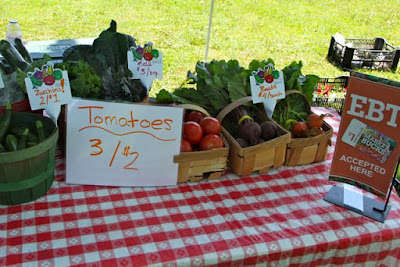FOOD VISION: There's at least a couple of books I'd like you to have read as background for this vision. In particular, it's indebted to insights provided by Michael Pollan's The Omnivore's Dilemma and Douglas Gayeton's LOCAL: The New Face of Food and Farming in America. Our current food production and commodity agriculture system offers abundant opportunities to do good instead of just less bad. Here's some of how I see it.
Chisago City farmers market
Photo by J. Harrington
Assume we're successful at making major progress on a transition from a fossil fuel based energy system to one that's based on renewable sources. We've effectively eliminated our dependance on fossil fuel operated internal combustion engines. That means we no longer need to produce ethanol for local consumption. If we convert many of our agricultural acres to real food production, following the example set by folks like Joel Salatin at Polyface Farm, and learn from folks like Wes Jackson how to produce grains from perennial plants instead of annuals, we can avoid a lot of the water pollution our current commodity agriculture produces. If we get away from "farms" that devote thousands of acres to row crops, we may find more than a few percent of our population living on farms. That could lead to a rejuvenation of "Main Streets" throughout the state.
click for details
In case it's not clear to you, the vision proposed for food production and agriculture is not so much to "improve" our existing agricultural commodity production system, which also has helps produce distressing levels of obesity at the same time many in this state go to bed hungry or undernourished. I'd like to see it replaced with something sustainable. In addition to many more family owned, multigenerational, local, beyond organic, etc. farms, I'd like to see more Community Supported Agriculture operations, more food co-ops, more schools with schoolyard gardens, more food hubs serving networks of local farmers and major consumers.
As long as we're at it, I'd like to as much place-based education as possible in Minnesota's school systems, including how to identify and forage for local "wild" foods and glean what may be left in the fields. There may be some of this occurring already, but not enough, I believe. We need more of it to address a multitude of problems from eating healthy to gardening for exercise, to water pollution abatement to building actual communities in which we know each other and rely more on relationships than on transactions governed primarily by dollars and regulations. Lots of these changes are occurring as this is being written. To attain the vision, we can accelerate many of these changes. I believe local food production (as describedin "LOCAL," especially on pages 255 and following) can do more to abate agricultural water pollution than any of us could hope for from a "command and control" approach. Plus, I've yet to meet or read anyone who doesn't claim that local food tastes better.
Prayer After Eating
by Wendell BerryI have taken in the light
that quickened eye and leaf.
May my brain be bright with praise
of what I eat, in the brief blaze
of motion and of thought.
May I be worthy of my meat.
********************************************
Thanks for visiting. Come again when you can.
Please be kind to each other while you can.
Thursday, October 1, 2015
Let's chew on this
Subscribe to:
Post Comments (Atom)


No comments:
Post a Comment